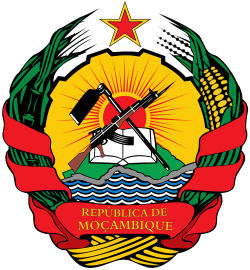 |
|---|
| |
Elections to a Legislative Assembly were held for the first and only time in Portuguese Mozambique in March 1973.
 |
|---|
| |
Elections to a Legislative Assembly were held for the first and only time in Portuguese Mozambique in March 1973.
On 2 May 1972 the Portuguese National Assembly passed the Organic Law for the Overseas Territories, which provided for greater autonomy for overseas territories. [1] Mozambique was to have a 50-member Legislative Assembly, of which 20 would be elected. The remainder would be nominated by public services, religious groups and business groups. [1]
Candidates were required to be Portuguese citizens who had lived in Mozambique for more than three years and be able to read and write Portuguese. Voters were required to be literate. [1] As the Portuguese constitution banned political parties at the time, the majority of candidates were put forward by the ruling People's National Action movement, although some civic associations were allowed to nominate candidates. [1]
Out of a total population of over eight million, only around 112,000 people were registered to vote. Voter turnout was around 92%. [2] Of all the Portuguese colonies holding Legislative Assembly elections, Mozambique was the only one to have a non-white majority of its membership, with 26 of the 50 members being non-white. [3] The 26 non-white members included 18 Africans, three coloureds, three Indians, one Goan and one Chinese. [1]
| Constituency | Elected members |
|---|---|
| Beira | Alda da Conceição Dias Carreira de Moura Almeida |
| Cabo Delgado | Atanásio Valério Muíto |
| Domingos da Silva Leal | |
| Gaza | António Abrantes de Oliveira |
| Filipe José Messano | |
| Inhambane | Felisberto Joaquim Machatine |
| Francisco Nelson Leal de Lima | |
| Lourenço Marques | Leonardo Samissone Bucucha |
| Manuel João Correia | |
| Moçambique | Abel Manuel Pott |
| Manuel de Almeida Saraiva | |
| Niassa | Francisco José Gonçalves Pires |
| Mário Ussene | |
| Tete | João António Dias |
| José Boaventura da Conceição Ribeiro | |
| Vila Pery | Luciano Henrique Nunes Pereira |
| Paulo Otheniel Dimene | |
| Zambezia | Arquíssandás Jugoldás |
| Rui Correia dos Santos Torres Vouga | |
| Source: Esteves [2] | |
| Nominators | Nominated members |
|---|---|
| Administrative bodies and public utility entities | Abdool Magid Abdool Karin Vakil |
| Inácio Bragança | |
| José Craveirinha | |
| José Palma Pinto | |
| Victor Manuel Videira Barreto | |
| Waldemar Fernandes Botelho | |
| Corporate organisations representing companies and associations of economic interests | Joaquim Francisco Valente Nunes de Carvalho |
| Jorge de Abreu | |
| José Luís Bobella Nogueira de Sampayo Torres Fevereiro | |
| Raul Teodomiro de Chaby Satúrio Pires | |
| Ricardo Ferreira Martins | |
| Salim Issá | |
| Organisations representing moral and cultural interests | Armando Rego da Silva |
| Carlos Jacinto Ferreira Pó | |
| Gilberto Lage Teixeira | |
| Gonçalo Castelo-Branco da Costa de Sousa Macedo Mesquitela | |
| Himlock | |
| Joaquim Pereira Soares | |
| Organisations representing workers | Almor Fernandes de Sousa |
| Assahel Jonassane Mazula | |
| Domingos Vieira Martins | |
| João Mateus Júnio | |
| José António Marrana | |
| Manuel Nobre | |
| Regional governments | Eduardo Cuna |
| Eugénio Pereira | |
| Francisco José Cabral | |
| Horácio Pereira Uachisso Zualo | |
| Jorge Adriano Nampula | |
| Luís Francisco Mabunda | |
| Source: Esteves [2] | |